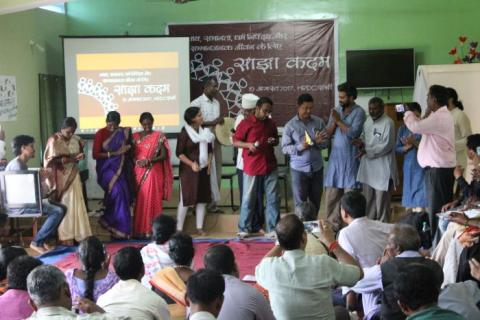Ranchi: A broad coalition of citizens and organisations came together today under the banner of Sajha Kadam to discuss the menace of growing communalism in Jharkhand and possible responses to it. The threat of communalism, evident in recent lynching incidents, was seen in the context of other threats to the right to life, including attempts to dilute people's rights to land, work and food.
Father Stan Swamy welcomed the recent rejection of dangerous amendments to the Chhotanagpur Tenancy Act and Santhal Pargana Tenancy Act, but he also pointed out that the proposed "land banks" posed an ever greater threat to people's right to life. When we asked the audience who had heard of land banks, only a few participants raised their hand. He observed that this was a symptom of the silence and ignorance that surrounds this ominous move.
Vasavi Kiro and Dayamani Barla also spoke on these issues. Vasavi Kiro drew attention to another attack on the right to life that has passed almost unnoticed: the "mahua policy" that prevents people from storing more than 15 kg of mahua in Jharkhand (in Chhattisgarh the limit is even lower - 5 kg). Poor adivasis who keep more than that at home risk being thrown in jail. Dayamani Barla presented a grim picture of the whole spectrum of attacks on people's livelihoods and land rights in recent years, including not only land banks and the mahua policy but also attempted dilutions of the land acquisition act.
Participants heard a range of testimonies of people affected by these measures and also by failures of the state government to protect people's entitlements under the National Food Security Act and the National Rural Employment Guarantee Act.
The session on communalism began with the presentation of a range of cultural resources (films, songs, poems, stories, plays, etc.) that can be used to counter communal propaganda. Participants resolved to use these resources to convene discussions of communalism and communal harmony in schools, universities, mohallas and villages.
Writer, activist and former IAS officer Harsh Mander spoke in moving terms about the growing wave of communalism and communal violence in the country. He recalled how a young Muslim boy, Junaid, had been stabbed 30 times on a crowded train without anyone intervening, and then left to bleed for an hour on a railway platform before anyone tried to help. He emphasised that in this situation of growing communal violence, silence is a form of complicity - if we don't speak out, we are party to these crimes.
The participants resolved to initiate a series of public activities and meetings to spread public awareness of these issues and counter the poison of communalism.
The organisations that convened this event include Sajha Manch, Bagaicha, Right to Food Campaign, Jharkhand Jungle Bacha Andolan, Jharkhand Nagarik Prayas, AKHRA, All India People's Forum, Bharat Gyan Vigyan Samiti, Ekta Parishad, United Mili Forum, NREGA Watch, Awami Insaf Manch (Jharkhand), Janwadi Lekhak Sangh (Ranchi), Jharkhand Adarsh Mahila Manch, Jharkhand Jan Sanskriti Manch, Mahua Adhikar Morcha, Idan, APCR Jharkhand, Aman Biradari, Bharat Jan Andolan among others.

